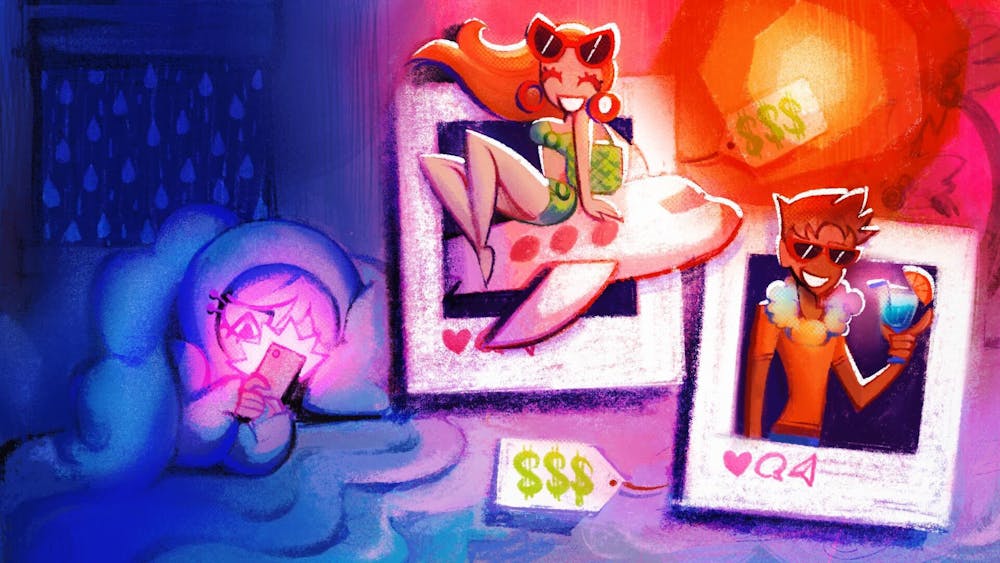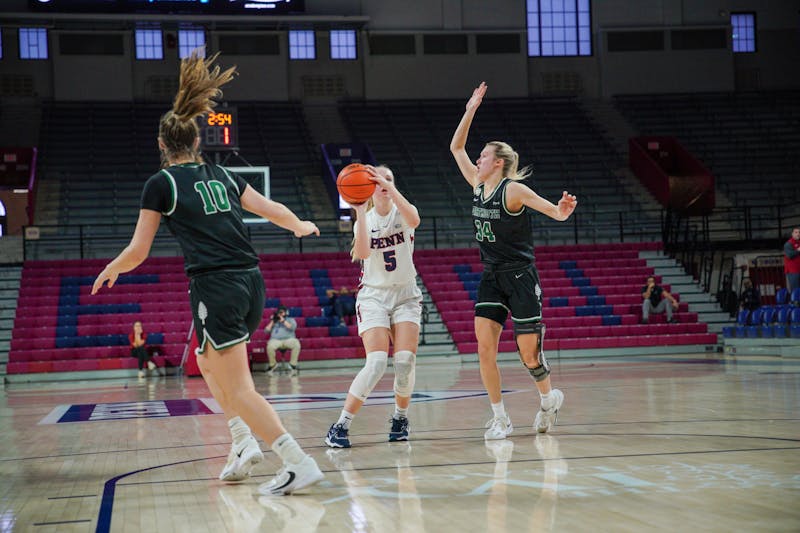
If I were to ask you: What makes a Penn student a Penn student? Would you say it’s being enrolled at Penn? Is there a unifying culture or ethos for all of us? Or is it something more subjective, like what you wear, where you’re from, what clubs you’re in, or who you know?
The “wealth gap” is a given and simply unavoidable at Penn. As an institution with one of the wealthiest student bodies in the country, it never goes unnoticed. As of 2017, the median family income of a student from Penn was $195,500, and 71% of our students come from the top 20% of average family income. Even if we pay little attention, we all recognize the level of wealth that surrounds us. Yet how does wealth and the way it’s displayed impact our experience of belonging? And why do we allow it to?
Scrolling through Sidechat over spring break, I saw a few comments that struck me: “Seeing everyone on real vacays while I rot in bed makes me so sad,” “whenever I open Instagram I get reminded that I go to school with millionaires and trust fund babies,” and “seeing everyone i know be on a yacht rn is slowly getting to me.” These comments were referring to the white sand, palm-tree lined, ocean view photos covering Instagram over spring break.
While many Penn students traveled far and wide for spring break, many, like me, stayed home. The comments came on the heels of the many organized or group-affiliated trips to Punta Cana, Casa de Campo, Puerto Rico, and more. These posts are examples of how social comparison can take a toll on one’s sense of belonging. This mindset is a recipe for disaster. Still, these Sidechat comments aren’t just about spring break — they reflect a larger reality at Penn. Our culture includes designer everything, luxury goods, and pampered lifestyles.
So many of us are so aggressively awestruck when we finally arrive on campus and are confronted with how many students’ wealths challenge our hierarchy of values and even self worth. Many at Penn have adopted the mindset that there is a positive correlation between financial means and belonging. Don’t be fooled — it’s a trap. Thinking those with more financial resources belong or deserve to be here, while those without the riches, well, don’t, is missing the point. I’ll admit it is difficult to abandon this notion when so many people on Locust Walk are donning their Canada Goose jackets, Golden Goose shoes, and Goyard bags, but having gobs of money isn’t the only metric for wealth. Sahil Bloom’s book “The 5 Types of Wealth” explains that time, social wealth, mental wealth, physical wealth, and yes, financial wealth, together, are a more complete measure.There is more than just financial wealth. In a recent Knowledge by the Slice talk, Penn Religious Studies professor Justin McDaniel made a sobering point about the imbalance in our focus on our academic training. He estimates that 16% of our lives will be spent at work (hopefully making money) but we spend enormous amounts of our time, mental capacity, physical well-being and social capital on how to get rich. I would argue that we also use this precious time on our obsession with financial wealth. But what about the other 84% of life? How are we appreciating what we have and investing in ourselves so we can deal with the rest?
Who has what and why does it really matter? Rich people will have expensive things. That’s a fact that simply won’t go away. And because of that fact, we shouldn’t attempt to change ourselves to fit in or feel like we belong. Furthermore, giving so much thought and energy to what others have doesn’t make those things magically appear for you. I also happen to believe that successfully completing a degree at Penn is a huge advantage and investment in your eventual financial stability. So, you’ll more than likely get to have a few of those high-end creature comforts at some point in your future. What’s more important is shifting your focus and widening your lens on wealth.
So why do we have such an obsession with what we don’t have rather than gratitude for what we do have? It’s difficult to escape imposter syndrome at Penn, whether academically or socially. It’s not uncommon to feel as if you need to live a certain lifestyle or own or experience certain things to feel better about yourself. But this mentality is dangerous. Just as sure as night turns to day, there will always be someone with more — and another possession promising to be your ticket to the “in crowd.” What’s needed is for you to take stock of what you’ve got and realize there are so many more people worse off.
I urge you to be true to yourself, whatever that means for you. Don’t waste your time trying to become what you think a Penn student “should” be — instead use this opportunity to become authentically who you were meant to be. There is no Penn aesthetic or blueprint to follow — the only requirement is to be yourself. This is the time and place for you to cultivate your talents, share your ideas, and if being yourself means purchasing the items mentioned above, then more power to you. But never think that because you don’t own luxury goods or lack a five-star lifestyle, it means you don’t belong. So, comparing yourself to those you deem “multimillionaires” and “trust fund babies” is pointless — true belonging comes from within. Whether you’re rocking Van Cleef & Arpels or you thrift on a budget, do you. That is the beauty of living in a diverse community, because there is nothing exciting about monoculture.
If you’re lucky enough to secure a spot and ultimately earn a degree from this institution, odds are your future is fiscally viable. Besides, it’s not how you start that matters, it’s how you finish.
MARIE DILLARD is a College first year from Englewood, N.J. studying history and urban studies. Her email is mdilla@sas.upenn.edu.
The Daily Pennsylvanian is an independent, student-run newspaper. Please consider making a donation to support the coverage that shapes the University. Your generosity ensures a future of strong journalism at Penn.
Donate








